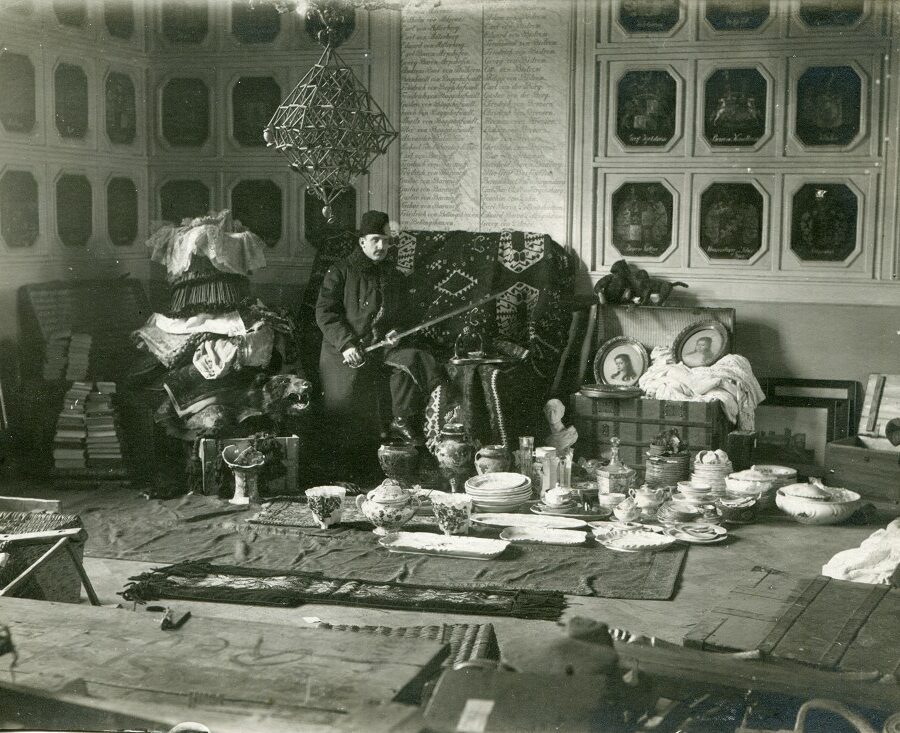
Tallinna Eesti Muuseumi kogud Rüütelkonna hoones 1921. aastal. Eesti Kunstimuuseum, EKMa.14.1.6.4.
EKA, A101
Start Date:
21.12.2023
Start Time:
11:00
End Date:
21.12.2023
On 21 December Mariann Raisma, a PhD candidate at Estonian Academy of Arts, curriculum of Cultural Heritage and Conservation, will defend the thesis „The Power of the Museum. Shaping Collective Memory in Estonia during the Turning Points of the 20th Century“ („Muuseumi võim. Muuseum kollektiivse mälu kujundajana Eestis 20. sajandi murranguperioodidel“).
Public defence will be held on 21st of December 2023 at 11.00 at EKA (Põhja pst 7), room A101.
Supervisors: Prof. Linda Kaljundi (Estonian Academy of Arts), Dr. Anneli Randla (Estonian Academy of Arts)
External reviewers: Dr. Anu Kannike (Estonian National Museum), Dr. Marleen Metslaid (Estonian National Museum)
Opponent: Dr. Anu Kannike (Estonian National Museum)
The defense will be held in Estonian.
Over the past two centuries, museums have played a pivotal role in shaping societies’ understanding of the past. They guide our perceptions of history, determine the delicate balance between forgetting and remembering, and influence the hierarchy of values associated with heritage.
This dissertation critically examines the power and influence of museums as mediums of cultural memory, with a focus on the Estonian museum field. Given that our identity is intricately tied to what we remember and what we choose to forget, it is crucial to understand the reasons and processes behind the shaping and shifting of collective memory throughout historical periods. This research focuses on the history of the Estonian museum in the 20th century, examining three periods which saw significant historical turning points: 1919–1925, 1940–1941/1944–1953 and 1987–1994.
The history of Estonian museums offers insights into how the core principles, values and canons for constructing cultural memory changed during these periods of social and political upheaval. These changes encompassed the nature and interpretation of ideologies, themes and how they were represented, museums as institutions, their hierarchy and nomenclature, the dynamics of the relationship between power and the institution, and the capacity, intent and ability of museums to shape society’s collective memory.
The identity and institutions of the Estonian museum field underwent significant changes throughout the 19th and 20th centuries. Beginning with self-definition rooted in European culture, museums transitioned to embracing ‘Heimat’ before evolving to value ethnicity. This evolution culminated in ideas for large national museums, which eventually diversified into various specialised museums during the 20th century. The regional discourse of the early 20th century gave way to a national narrative, followed by a Soviet-Marxist perspective. In the final decade of the century, national cultural memory underwent a revival. This sequence of ideas was also reflected in history-themed permanent exhibitions: the 1920s witnessed the legitimisation of popular culture as elite; the 1940s established a normative approach to historical materialism; and from the late 1980s, nationalism triumphed once again, ushering in new museological approaches. While analysing all these changes, this dissertation emphasises the hybridity of Estonian museum history and its interweaving with different cultural spaces and paradigms.
Throughout the three periods of upheaval discussed, museums were at the forefront of the shaping of a new cultural memory canon. Correspondingly, these turning points have contributed to the formation of Estonia’s own unique museum field.
The thesis is available HERE.
Members of the Defence Committee: Prof. Krista Kodres (Head of the Committee), Dr. Anu Allas, Prof. Hilkka Hiiop, Prof. Juhan Maiste, Prof. Kurmo Konsa
